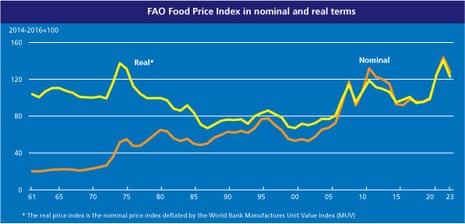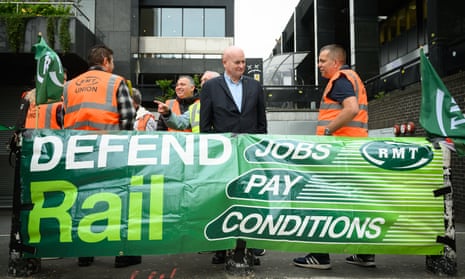Pound heads for strongest rally against dollar in six months
The pound is on track for its best week so far this year.
So far this week, sterling has gained 1.5% against the US dollar, or almost two cents, to $1.253 this morning.
The rally comes as investors conclude that interest rates are likely to level off sooner in the US than in the UK, given Britain’s persistent inflation problem.
In the UK, annual inflation was 8.7% in April, compared with 4.9% in the US.
The latest US jobs report, at 1.30pm, will help the US Federal Reserve judge if jobs creation, and wage growth, is slowing due to higher borrowing costs.
Relief that the US should lift the debt ceiling, to avoid a default, are also providing some support.
Fawad Razaqzada, market analyst at City Index and FOREX.com, explains:
Risk sentiment has improved markedly with the passage of the US debt ceiling deal through Congress. This kept European currencies supported on Friday morning.
Key events
There are also likely to be painful job cuts at Swiss bank Credit Suisse, following its takeover by UBS.
UBS chief executive Sergio Ermotti told a financial conference in Bern today:
“We won’t be able to create, short term, job opportunities for everybody. Synergies is part of the story.
“We need to take a serious look at the cost base of the standalone and combined organisations and create a sustainable outcome.
It will be painful.”
Full story: Fiat seeks incentives from UK for motorists to buy electric vehicles
Fiat has called on the government to boost incentives for British motorists to buy electric vehicles, after warning that growth in UK sales of the vehicles has tailed off after a key subsidy was scrapped last year.
Writing in an open letter to the government, the car manufacturer said other countries around the world were providing more support for the transition to electric vehicles and argued more action was required in Britain.
It comes a year after ministers scrapped the last remaining subsidies for electric cars, saying it would free up funds to expand the charging network and support other battery-powered vehicles.
However, car manufacturers warned this week of a gulf between the number of electric vehicles on the road and public charging points, with the shortfall more than doubling in some parts of the country in the past year….
More here:
Mike Ashley’s Frasers to lay off up to 200 workers – Reuters
Mike Ashley’s Frasers Group is set to lay off up to 200 employees, as the British retailer looks to streamline its business after making a string of acquisitions in recent years, Reuters reports.
A spokesperson for the company, which was previously called Sports Direct, said in an e-mail.
“We are reviewing our team structures to identify efficiencies and streamline processes, and we have entered a consultation period with colleagues affected by these changes,”
The job cuts were first reported by the Sun last week.
Ashley – who once owned the Newcastle United football club – no longer heads Frasers but holds a roughly 70% stake in the company, which owns brands including House of Fraser, Flannels, USC and Jack Wills.
Earlier this week Frasers narrowly avoided falling out of the blue-chip FTSE 100 index in the latest reshuffle.
The Department for Transport have responded to Fiat’s call for more support to incentivise drivers to buy electric cars.
A DfT spokesperson said:
“We’ve invested more than £2bn into accelerating the transition to electric vehicles, and grants have been in place for over a decade to support the transition to zero emission vehicles – supporting more than 340,000 so far.
“To ensure value for the taxpayer, our support is now targeted where it will make most impact, including grants for vans and taxis, and support for the roll-out of rapid chargers.”
Pound heads for strongest rally against dollar in six months
The pound is on track for its best week so far this year.
So far this week, sterling has gained 1.5% against the US dollar, or almost two cents, to $1.253 this morning.
The rally comes as investors conclude that interest rates are likely to level off sooner in the US than in the UK, given Britain’s persistent inflation problem.
In the UK, annual inflation was 8.7% in April, compared with 4.9% in the US.
The latest US jobs report, at 1.30pm, will help the US Federal Reserve judge if jobs creation, and wage growth, is slowing due to higher borrowing costs.
Relief that the US should lift the debt ceiling, to avoid a default, are also providing some support.
Fawad Razaqzada, market analyst at City Index and FOREX.com, explains:
Risk sentiment has improved markedly with the passage of the US debt ceiling deal through Congress. This kept European currencies supported on Friday morning.
World food prices fall to two-year low in May
Global food commodity prices have hit their lowest level in over two years, according to fresh data from the United Nations food agency.
The Food and Agriculture Organization’s (FAO) price index, which tracks the most globally-traded food commodities, has hit its lowest level since March 2021.
There were “significant drops” in the price indices for vegetable oils, cereals and dairy, which were partly counterbalanced by increases in the sugar and meat indices, the FAO reports.
The price index fell to 124.3 points in May, down from 127.7 in April. It is now 22% lower than the all-time high of March 2022, after the invasion of Ukraine sparked a surge in food costs.

The report shows that:
-
International wheat prices declined by 3.5 percent month-on-month, reflecting prospects for ample global supplies in the upcoming 2023/24 season and the extension of the Black Sea Grain Initiative.
-
The Vegetable Oil Price Index fell 8.7% in May, and was 48.2% below its year-earlier level. The continued decline in the index reflected lower world prices across palm, soy, rapeseed and sunflower oils.
-
The Dairy Price Index fell 3.9%, led by a steep drop in international cheese prices, principally due to ample export availabilities, including from inventories, amid seasonally high milk production in the northern hemisphere

Strike action over the last year has been a success despite the lack of a pay deal, RMT general secretary Mick Lynch has said.
Speaking from the picket line at Euston station, as today’s strike action got underway, the union leader said that the action had pushed back plans that would have negatively impacted RMT members.
Lynch said:
“We’ve pushed them back on all the stuff they wanted to do, they wanted to make thousands of our people redundant, they wanted to shut every booking office in Britain, restructure our engineering workers, cut the catering service.
“So we’ve pushed them back on that, they haven’t been able to implement any of their plans.

Lynch added:
“What we haven’t got is a pay deal, we haven’t got any guarantees on our members’ futures but we have stopped them doing the worst aspects of their proposals and their ideas.
“It has been a success, our members are still with us, they’ve had three ballots to continue with the strike action under the law. Other people seem to have been inspired to fight back and take action in their own industries, so it has been a success and it’s put trade unions back on the map in Britain.”
Lynch also accused the government of “subsidising” disruption on the railways, telling Radio 4’s Today programme:
“They are subsidising this disruption: £900 million has been delivered to the train operating companies to deliver this dispute. They are enforcing the disruption.
“All we want is a pay rise and the protection of our terms and conditions.”
RMT strike in England begins two days of rail disruption
More than 20,000 rail workers in England have begun a 24-hour strike that will cancel half of the services on affected lines as part of a long-running dispute with train operators over jobs, pay and conditions.
The stoppage by the National Union of Rail, Maritime and Transport Workers (RMT) – the second of three by rail unions to hit the network this week – will affect most operators in England and some cross-border services into Scotland and Wales.
Then on Saturday more than 12,000 members of Aslef, the train drivers’ union, who went on strike on Wednesday, will carry out another day of industrial action that will leave only 40% of services running.
The wave of rail disruption coincides with half-term holidays for most schools in England and Wales, and will cause difficulties for people travelling to events in London this weekend. Those affected include supporters travelling to see the FA Cup final at Wembley on Saturday between Manchester City and Manchester United, racegoers hoping to attend the Epsom Derby and tens of thousands of Beyoncé fans hoping to catch the pop star’s Renaissance tour shows in the capital.
Rail operators have said services on Friday and Saturday will be severely reduced and have urged passengers to plan their journey before travelling.
More here, by my colleague Casper Hughes:
Fiat calls for more incentives to kick-start UK electric car demand
Car manufacturer Fiat has warned that growth in electric car sales in the UK is tailing off, and called for more government help to get people to switch from fossil fuel vehicles.
Fiat is concerned that EV sales are not accelerating as quickly as it or other manufacturers expected.
In a letter to the government, it warns that the market share of EV’s in the UK has plateaued in the year since the Plug-in Car Grant (PiCG), which subsidied the cost, was abolished.
Fiat is now asking ministers to boost incentives for British motorists to make the switch to electric vehicles (EVs).
Fiat are also offering a £3,000 discount to its electric cars, dubbed the Fiat ‘E-Grant’, which is larger than the phased-out government subsidy.
Damien Dally, Fiat UK’s managing director, told Radio 4’s Today Programme that the EV market has grown from less than 1% in 2019 to 15% today.
Dally says:
That means 85% of people are not buying electric vehicles today. And it’s really halted since the removal of the grant.
Fiat believes that demand for EV cars will start to tail off in six month’s time, Dally says.
He agrees that a better charging infrastructure would help the EV industry, but insists charging is becoming easier.
A new report from Resolution Foundation this week shows that the move away from petrol and diesel cars will create a £10bn shortfall in tax revenues – arguing for a new “package of measures that ensure EV drivers start to pay their way”.
Fiat’s Dally, though, argues that the government needs to do more to incentivise the shift to EV, saying:
I think the government is already talking about looking at other ways of taxing in terms of road tax, etc. I think that’s been discussed for 2025.
But ultimately, at the moment…we need to give people equally a reason to make that switch.
Dally argues that could be tax breaks, either subsidies or similar incentives, to encourage motorists to shift, warning that demand is “really, really dropping off significantly”.
It’s understandable, because of the cost of living crisis etc. People need a reason to buy. Otherwise, I think they will just walk into another petrol or diesel car.
Fiat’s calls follow similar pressure on the government from elsewhere in the automobile industry.
Its parent company Stellantis, which also owns the Peugeot, Chrysler and Citroën brands, warned last month that post-Brexit trading arrangements are a risk to its operations in the country.
Senior officials in Brussels are now urging the UK to join a pan-European agreement on goods trade to limit the damage to its car industry from looming post-Brexit tariffs, the Financial Times reports today.
The FT says:
From next January, electric vehicles shipped between the UK and the EU will need to have at least 45 per cent of their parts sourced from within the two regions or face 10 per cent tariffs, under “rules of origin” terms set out in their post-Brexit trading agreement.
The limit rises to 60 per cent for batteries, which make up a significant part of the value of an EV, and is particularly problematic as the UK and EU still import many from China, South Korea or Japan. London wants the EU to delay the introduction of the levy until 2027.
The move is backed by carmakers in the UK and EU, which have warned they will not be able to comply with “rules of origin” from next January due to the lack of battery manufacturing capacity in Europe.
In a boost for France, industrial production across the country has picked up – helped by a drop in strike action.
Manufacturing output rose by 0.7% in April, new data from statistics body INSEE shows, while wider industrial output gained 0.8%.
🇫🇷 France French Industrial Production (MoM) (Apr) $EUR
Actual: 0.8% 🟢
Expected: 0.3%
Previous: -1.1%— PiQ (@PriapusIQ) June 2, 2023
Output “bounced back substantially in the manufacture of coke and refined petroleum” – rising by +23.6% in April after a 45.2% plunge the previous month.
That, INSEE said, is because the strikes in refineries were less significant than in March, when protests against president Macron’s pension reforms blocked several French refineries from delivering products.
The health of the US jobs market will also be in the spotlight today, when the latest non-farm payroll is published.
Economists expect a slowdown in hiring last month, with around 193,000 new jobs created, down from 253,000 in April.
A sharp slowdown could deter the US Federal Reserve from raising interest rates again, while a strong NFP could spur them on.
All eyes on the US labour market report this lunchtime, as traders mull over whether the Fed will pause, or skip, in June
Headline NFP exp. +195k…would expect a print >230k to have hawkish implications, <150k to be interpreted dovishly pic.twitter.com/DL7Uia6usO
— Pepperstone (@PepperstoneFX) June 2, 2023
The question of the sustainability of France’s public debt has moved back into the spotlight, analysts at ING warn.
In a report published yesterday, ING warn it has become “an important issue for the government, the general public and the rating agencies alike in a context of economic slowdown, rising interest rates and a minority government in parliament”.
As they point out, France’s national debt has risen due to recent economic shocks:
Already well above the eurozone average, the ‘whatever it costs’ approach of the government has led to a significant increase in French public debt since the pandemic, rising from 97.4% of GDP in 2019 to 111.6% of GDP in 2022.
Over the period, this represents an increase of 14.2 percentage points, the highest among eurozone countries after Spain. By the end of 2022, France was the fifth country with the highest debt-to-GDP ratio in the eurozone, well above the European target of 60%.
If policy remains unchanged, the government estimates that public debt could continue to rise over the next few years, reaching 114.6% of GDP in 2027.
French president Emmanuel Macron has also been warned that the country can’t afford tax cuts without also trimming spending.
Yesterday, Bank of France Governor Francois Villeroy de Galhau told a conference:
“We need to make a bigger effort on the public finances, we need to be careful about unfunded tax cuts and letting spending grow too quickly,”
Last month, Macron revealed he had asked his government to draw up €2bn worth of tax cuts that would benefit the middle class.
Introduction: Standard & Poors expected to rule on France’s credit rating
Good morning, and welcome to our rolling coverage of business, the financial markets and the world economy.
France is bracing for a possible credit rating downgrade today, despite some strenuous efforts by Paris to fend the risk off.
Standard and Poor’s, one of the Big Three rating agencies, is expected to update its assessment of France’s credit-worthiness later today.
Back in December S&P cut France’s outlook to “negative” from “stable”, due to rising risks to the country’s public finances, so it could now cut France’s AA rating – the third-highest notch.
Since December, France’s economy has grown by 0.2% in the January-March quarter, and president Emmanuel Macron has signed a controversial pension reform into law, after wide protests and much bashing of pots and pans on the streets by furious members of the public.
In April, Fitch downgraded France’s sovereign credit rating and warned that Macron’s reform agenda could stall following the battle to increase the country’s retirement age.
And last week another rating agency, Scope, lowered its outlook on France’s credit rating, blaming weakening public finances and risks to Macron’s economic reform agenda.
A downgrade could be embarrassing for Paris, and raise questions about Macron’s efforts to spur growth and reduce a debt burden that has been pushed higher by spending on the pandemic and then subsidising energy costs since the Ukraine war.
The risk of a downgrade on Friday “could be a wakeup call for the markets,” Adam Kurpiel, rates strategist at Société Générale, told Bloomberg, adding:
“We and the rating agencies have been highlighting the weakness in France’s public finances for some time.”
France’s finance minister, Bruno Le Maire, pledged in April to “accelerate France’s debt reduction”. He is aiming to lower the national debt from 111.6% of GDP to 108.3%, by 2027.
By then, Paris hopes to have brought the budget deficit down to 2.9% of GDP, back below the 3% limit set under the European Union’s Growth and Stability Pact.
Earlier this week, La Maire launched an effort to deter S&P from cutting France’s credit rating.
He told public broadcaster France Inter that he made a compelling case to S&P when he met its representatives earlier this week, pledging to be “uncompromising” with the debt reduction plan.
Le Maire pledged:
“We have good arguments to put forth.
Prime minister Elisabeth Borne said on Sunday that Le Maire is in “very close discussions” with S&P.
Borne told Radio J.
“I think there were detailed explanations from Bruno Le Maire to Standard and Poor’s on everything we’re doing to control our public finances and I think that we act in this direction.”
The US, though, can breathe easier about its credit rating today. Last night, the US Senate narrowly passed a bill to suspend the debt ceiling, which should avert the risk of a default that could have wreaked havoc on the US economy and global markets.
The agenda
-
7.45am BST: French industrial production data for April
-
9.30am BST: The latest realtime UK economic activity data
-
1.30pm BST: US non-farm payroll jobs report for May











